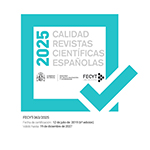Perspective of businesswomen in Mexico in the frameworks of the SDGs
Abstract
Introduction. Gender equality is a fundamental and essential human right. Despite the advancement of women's participation in the spheres of economic, political and social life, we are more than a century away from achieving that equity. The objective of this research is to present a retrospective analysis of women's participation in the economy, particularly in business in Mexico. Methodology. A theoretical, normative and statistical review has been carried out on the women’s participation in the workplace, education and business, particularly for Mexico, within the framework of the 2030 agenda. Results. In quantitative terms, substantial progress can be seen in education and, incipiently, in the wage gap and the double workload, but in qualitative terms, discrimination and exclusion remain barely perceptible. This is confirmed in the sectoral labor participation in economic life, linked to education as a precedent and the salary gap as a consequence. The field of business does not present a different reality, as man continues to be in charge of the administrative councils, management and companies’ properties. Entrepreneurship has been taken as an alternative to achieve the women’s empowerment in business, however, her reality is replicated and with greater intensity than what she experiences as a worker. In Mexico, the scenario is not so different, the real changes have occurred in education and normatively in politics, but in the economic sphere, it is still far from substantially reducing gender exclusion and discrimination. Conclusion. The SDG on gender equity will be difficult to achieve, as long as sociocultural patterns inherited from the double workload persist and long working hours be adopted in a framework of competition.
Downloads
Article download
License
In order to support the global exchange of knowledge, the journal Investigaciones Feministas is allowing unrestricted access to its content as from its publication in this electronic edition, and as such it is an open-access journal. The originals published in this journal are the property of the Complutense University of Madrid and any reproduction thereof in full or in part must cite the source. All content is distributed under a Creative Commons Attribution 4.0 use and distribution licence (CC BY 4.0). This circumstance must be expressly stated in these terms where necessary. You can view the summary and the complete legal text of the licence.











